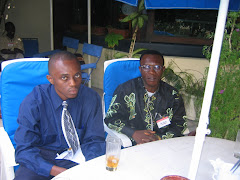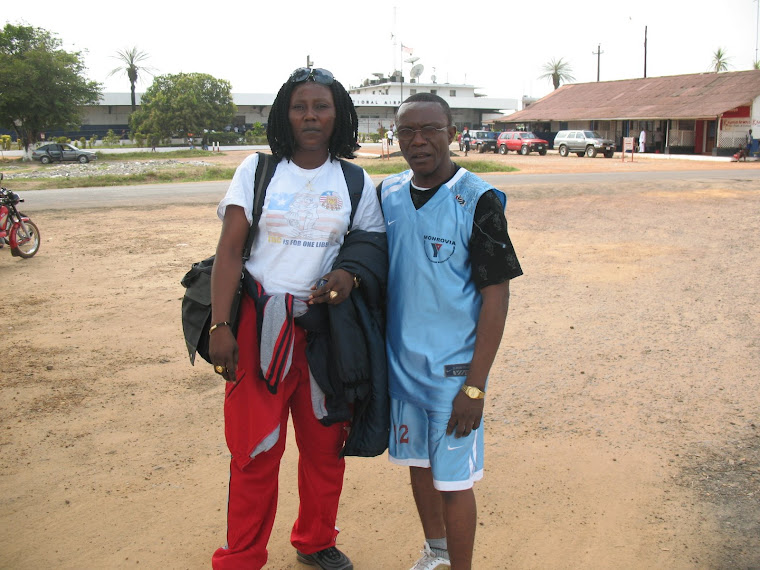
The growing competition of mobile communication – especially GSM companies in Liberia – has been benefiting the people of the country and makes the instancy of communication reliable. This was the case of a just ended treason trial in Monrovia, when the relatives of acquitted defendants took over the ground with mobile phones calling their distance relatives, family people and kinsmen from the interior of the country and from the diaspora.

The acquitted defendants, former Liberian General Charles Julu and retired Colonel Andrew Dorbor were accused last year of a plot to overthrow the Ellen Johnson Sirleaf Government, but the case of which a previous verdict of a jury trial was set aside on a defense lawyers’ allegation of bribe solicitation against the Jurors had a none jury trial that ended Friday, 02 May 2008 with an acquittal.
Following pronouncement of the acquittal of the two former military brass, their family people, kinsmen and well-wishers started to jubilate, and their jubilation took the trend of mobile phone celebration. Shouting on their various phones, the families, friends and well-wishers were seeing in varying direction communicating to people afar minutes from the courtroom, relating the acquittal to people of distance.
Besides, journalists were using the cellphones to contact their respective radios, and television stations and newspaper officers to break the landmines acquittal of people accused. The scene was so much exciting that that area –front views of the Temple of Justice was turned to a mobile phone jubilation party.
“You see, the cell phone makes it easier now days,” a man who called himself Philip Jardea told this reporter when he was asked whether their families abroad will know about this acquittal the very day. The case was important so much on ground that it has been as far as history is concern that a Liberian government charges someone with treason and the person gets acquitted, except that such may be through an intervention of Executive Clemency.
 …“Cellphones Have Made It Easier”-Says A User
…“Cellphones Have Made It Easier”-Says A User Mr. Jardea said he was telling Grand Gedeans the news of the acquittal of their kinsmen that were released based on acquittal judgment by the court. In any case, GSM companies are competing covering the borders of the country. At president, Liberia has four GSM companies. The first was LoneStar Communications, the second was Libercell of the Atlantic Wireless (Liberia) Ltd, first in term of non-GSM prepaid mobile phones. The two were followed by CELLCOM Communications and then COMIUM Communication.
As we speak, all of these GSM phones which started beaming signals from Monrovia have covered nearly the 15 counties of Liberia, making instant communication possible between families and people in Liberia.
Before that time, communication was done through letters, and it could take months or years for one family man to hear from the other from either abroad or within the same Liberia.
As my colleague Mae Azango of FrontPageAfrica.com reports Bolahum, Lofa County, she discovered that the any environment or community is bound to be backward in absence of Mobile communication, in that people everywhere nowadays want access to communication in order to keep in touch with families, friends and loved ones. Mobile communication in most parts of rural Liberia is accessible due to GSM services provided by the four mobile communication companies - Lone Star, Cellcom, Liber Cell and Commuim.

Some elders in Massabolahun, a village in Kolahun district say their constituents have to go to specific elevated areas to catch a small signal only of Lone Star to communicate.
However it was discovered recently that in parts of Lofa County , northwestern Liberia , access to mobile communication is poor.
Kolahun which is the largest district in Lofa is backward in GSM communication. People wanting to communicate through mobile with their families and friends have to go to specific elevated areas to catch a small signal only of Lone Star to communicate. The rest of the GSM companies do not have signals in these areas. Hence the questions: What happens to one in times of emergency, when you have to take a dying person to the hospital with in thirty minutes? When will you walk to the spot to call and get help?

Massabolahun, a village in Kolahun district with 6,000 and 200 inhabitants and 450 houses suffers the problem. Mamadu Konneh, town Chief of Massabolahun told FPA that they are suffering in getting the signal of Lone Star GSM in their area. “We always have a lot of death cases that would not have occurred if we had efficient communication (mobile) service. The small signal we are getting is coming from Foya.” (Foya is another district). He expressed his thanks to Lone Star, saying “thank you Lone Star you are doing well, but you have to work harder because you have more Costumers in this part of Lofa.”
But Massabolahun is not the only community where people have to find elevated areas to communicate. A similar situation exists in Bolahun, Nevertheless Lone Star is as far as Manikorma, the bordering town with Sierra Leone and other bordering towns with Guinea and in the Sierra Leonean village of Baindu .
At the Lone Star GSM head office in Monrovia , FPA spoke with Mr. Theo Greene, an employee of its Customers Service. He told our reporter “we will discuss it with our technicians to see how best they work toward it.”
Before the coming of Lone Star, Liber Cell operated in Liberia as Atlantic Wireless, and dealt only with satellite phone services which most people could not afford at the time. In May 2001, Lone Star open and later brought her first GSM Erickson phone for $US 100.00 a piece, sold SIM card or chip at $US65 and the lowest recharge card at $US15.00.
However because of the intense competition, Lone Star was forced to bring down her price when Cellcom brought Motorola C-15 phones for US$49.00 a piece and sold sim or chip with units at US$5.00. Many consumers started buying phones and taking them to rural Liberia to sell at US$55.00 a piece.
This compelled Lone Star to bring a consignment of phones which sold for US$40.00 a piece. When Cellcom saw this, she brought in a consignment of Motorola C-13 for US$39.00, US$29.00, and US$15 a piece, depending on the season/time they were imported into the county. But at present, Cellcom still has her phone at US$29.00. Now, Lone Star has brought in a new consignment of phones, going for US$25.00 a piece.
The Interesting factor now is that people all over Liberia has begun to browse the internet through the use of Mobile Phones, and each company has tried to ensue that it avails internet GPRS in its services to the people.




1 comment:
Nice post It’s very useful for me and I am very much impressed with your meaningful thoughts. I regard something truly interesting about your web blog so I saved to favorites.
Liberia Cellcom Recharge
Post a Comment